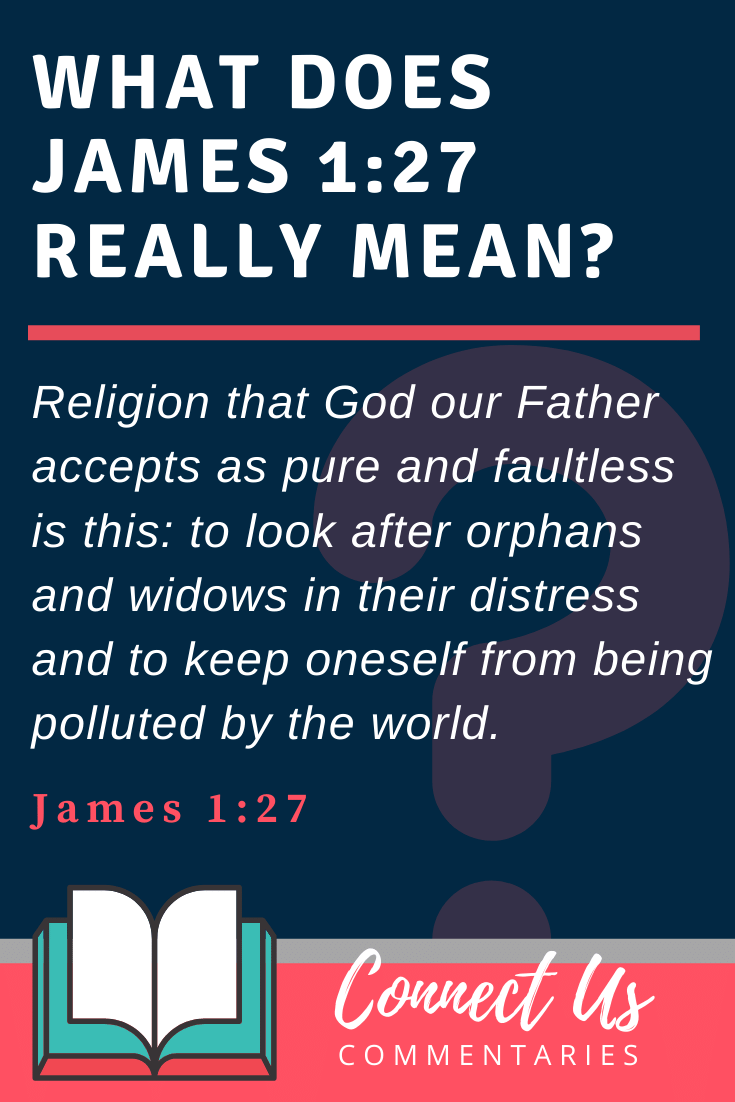James 1:27
“Religion that God our Father accepts as pure and faultless is this: to look after orphans and widows in their distress and to keep oneself from being polluted by the world.”
Explanation and Commentary of James 1:27
This is very specific instruction about how to be a follower of Jesus, or in other words, how to be “religious.” The word religion is sometimes today used in a negative way to describe a person who hypocritically goes through the motions of religion, but does not live in obedience to God. They may practice a form of goodness, but ignore key areas, such as pride and greed.
But here, James is using the word synonymously with belief. If one wants to be “religious in a way that the Father accepts, one must look after those who need help and cannot help themselves, and one must shun the ways of the world that pollute the soul. Part of this is very specific, caring for the truly needy. The other part, avoiding the pollution of the world is more general, and one would need the rest of the Bible to flesh out all the ways in which this is possible.
It is worth noting that in the verse just prior to this, James takes issue with those who would claim faith in God but don’t keep a reign on their tongue. Perhaps this is the reason for the admonishment to avoid the world’s pollution. Jesus said that a man is polluted by what comes out of his mouth as it shows what is in his heart (Mt 15:11).
Breaking Down the Key Parts of James 1:27
#1 “Religion that our Father accepts as pure and faultless…”
God is not looking for an outward show of piety that is not accompanied by an inward state of pure and faultless devotion. This does not mean that a Christian must be perfect, but it does mean they must genuinely love and follow God. They must fear him rightly and seek to obey him according to his righteousness.
#2 “…is this: to look after orphans and widows in their distress…”
There is no Christian who is not to care for the poor. God makes a distinction in the Word between the poor who could be working or cared for by family (2 Thes 3:10; 1 Tim 5:3), and the helpless poor. In biblical societies, and perhaps even today, orphans and widows were most likely to fall into that category. God’s plan for them was the Church. The Church should be ashamed to entrust this work to the government, who must steal the money from the public in order to inefficiently distribute it to the poor.
#3 “…and to keep ourselves from being polluted by the world.”
The world and its ways fall under the dominion of darkness ruled by the evil one (Jn 14:30). Christians are called to be in the world but not of it. Once we allow ourselves to become “of” the world, we are in danger of a polluted heart. This will affect our worldview in such a way that we can no longer set ourselves apart from the world by our goodness and purity. If the world cannot look to the Church to see what God is like, then there would be no hope for anyone to be saved.
Bible Study on James 1:27
Expert Overview of James
Biblical Translations of James 1:27
NIV
Religion that God our Father accepts as pure and faultless is this: to look after orphans and widows in their distress and to keep oneself from being polluted by the world.
NLT
Pure and genuine religion in the sight of God the Father means caring for orphans and widows in their distress and refusing to let the world corrupt you.
ESV
Religion that is pure and undefiled before God the Father is this: to visit orphans and widows in their affliction, and to keep oneself unstained from the world.
KJV
Pure religion and undefiled before God and the Father is this, To visit the fatherless and widows in their affliction, and to keep himself unspotted from the world.
NKJV
Pure and undefiled religion before God and the Father is this: to visit orphans and widows in their trouble, and to keep oneself unspotted from the world.

Natalie Regoli is a child of God, devoted wife, and mother of two boys. She has a Master's Degree in Law from The University of Texas. Natalie has been published in several national journals and has been practicing law for 18 years.